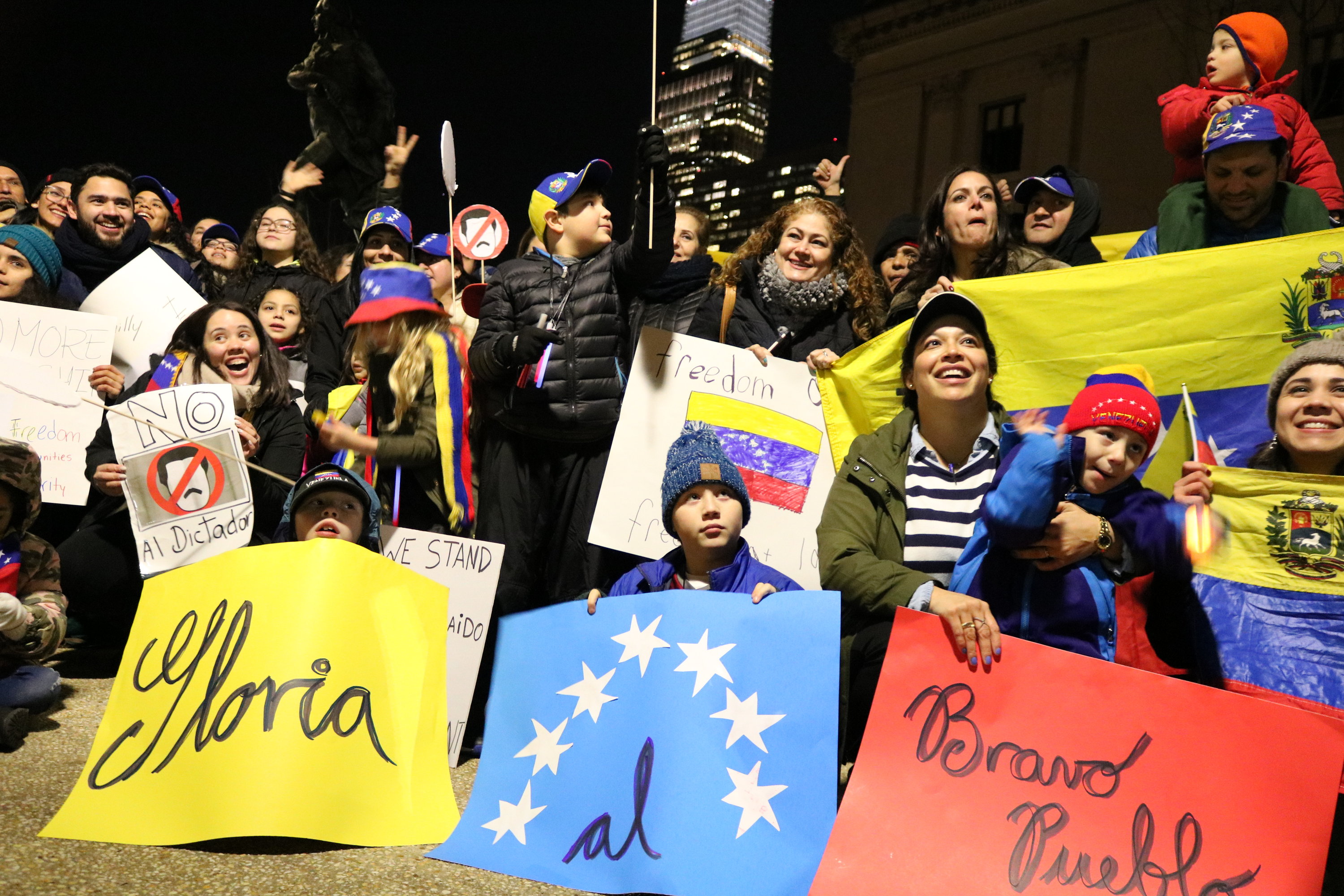
Venezuelans in Philadelphia celebrate challenge to Maduro
In an emotional gathering organized by Casa de Venezuela of Greater Philadelphia, Venezuelan-Americans gathered to support their self-declared interim…
“Gritemos con brío, muera la opresión...la Ley respetando la virtud y honor” (“We cry out with bravery, may oppression die...the Law respecting virtue and honor”), the words of Venezuela’s national anthem echoed between Center City Philadelphia buildings on Wednesday evening.
Dozens of Venezuelan-Americans celebrated, sang and cried tears of happiness and relief around the Francisco de Miranda statue on the Benjamin Franklin Parkway on Wednesday, hours after opposition leader Juan Guaidó swore himself in as interim president of Venezuela in Caracas.
“We’ve been fighting for this. Many young people have died defending this, this flag, our tri-colored flag,” said Yelitce Testini, a Venezuelan immigrant, while waving the nation’s yellow, blue and red flag in triumph.
Casa de Venezuela of Greater Philadelphia organized in solidarity with Venezuelans across the U.S., and in their capital city of Caracas, in order to demonstrate their demand of longtime dictator Nicolás Maduro: to get out of Venezuela.
The National Assembly of Venezuela and world leaders declared Maduro’s election win on Jan. 10 illegitimate, and recognized Guaidó, 35, who heads the National Assembly, as the country’s democratic leader. It was fitting for Venezuelans in Philadelphia to cheer their freedom in front of the Venezuelan Miranda statue, a sign of democracy and independence during the Revolutionary War, said Fernando Torres, president of Casa de Venezuela.
“Our families are extremely excited to be in the the streets,” Torres said. “One of our family members said it very simple, ‘what do we have to lose.’ We've got nothing else to lose. We are dying of hunger, we’re dying of not having basic medicine. Children don't have the nutrition to live, so there's nothing to lose.”
The National Assembly decided to invoke its constitutional right to overtake the presidency when the position is considered vacant. It’s ironic, Torres said, that the regime is being toppled by its people’s own constitution.
There are generations of Venezuelans who have never known basic freedom and human rights, or life without a dictator’s rule. Maduro’s predecessor, Hugo Chávez, assumed power in 1998, wiping out Venezuela’s vast wealth from its oil reserves with government consolidation of industry. For well over a decade, Venezuelans have experienced little more than hunger, shortage of medicine, poverty, speech suppression and fleeing.
What brings Venezuelan-Americans the greatest joy in this moment is optimism that young generations of Venezuelans will experience freedom and be able return and thrive in their home country, said Casa de Venezuela member Rosana Arteaga-Lopenza, who was with her three young sons on the Parkway Wednesday evening.
“That's the dream,” Arteaga-Lopenza said. “...We’re in a bicultural family, I'm raising my kids here, but it’s a huge frustration that I cannot take them there because it’s not safe enough.”
“I remember I used to go back [to Venezuela] on my summer vacations,” she added. “I want to be able to do the same for my kids.”
RELATED CONTENT
There is also hope the humanitarian crisis will begin to fade along with the regime that brought it, and that quality of life will improve for the Venezuelans who did not have the option to escape to nearby countries like Colombia and Ecuador, or to the U.S. Guaidó’s daring attempt to save Venezuelans from suffering and declare himself president has inspired many, Testini said.
“I like his determination, his youth. He's professional. He doesn't fear the government,” Testini said. “He's always fought and marched together with us as a political leader. No one else has confronted what's happening with strength, like he has.”
On Wednesday, United States President Donald Trump declared his recognition of Guaidó as Venezuela’s elected leader and encouraged other world leaders to do the same. Trump called Maduro illegitimate, and said the Venezuelan people have “demanded freedom and the rule of law.”
“We continue to hold the illegitimate Maduro regime directly responsible for any threats it may pose to the safety of the Venezuelan people,” Trump’s White House statement read. “As Interim President Guaido noted yesterday: ‘Violence is the usurper’s weapon; we only have one clear action: to remain united and firm for a democratic and free Venezuela.’”
Maduro responded by ordering all American diplomats living in Venezuela to leave the country in less than 72 hours.
While Venezuelans are pleased that the revolution was relatively peaceful, though 7 have died and they worry about retaliation from the Maduro regime and possibly from the National Guard, which has remained loyal to Maduro since he took office in 2013. Torres said Venezuelans are unsure whether the armed forces will retaliate and attack demonstrators, who will likely fill the streets of Caracas until Maduro is expelled.
In the U.S., Venezuelan-Americans continue to push a bipartisan House of Representatives Bill that would give refugees from the country Temporary Protected Status. There is a similar bill in the U.S. Senate, Torres said, and the bill’s supporters will be lobbying for the necessary votes.
“The next thing is we have a strategic plan for the next three months to get 180 signatures,” Torres said. “That's our target nationally. We start with Boston, New York, Virginia, in North Carolina, everywhere [Casa de Venezuela] has an organization, we’re going through and giving speeches about this bill.”











LEAVE A COMMENT:
Join the discussion! Leave a comment.